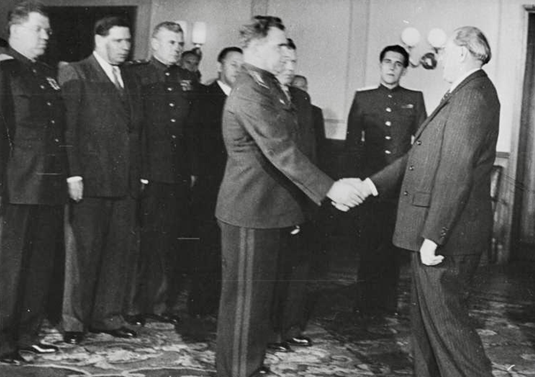Emotional Intelligence: A True Hero’s Strong Spirit
- Maria A. Kithcart

- Jan 11, 2022
- 4 min read

Pictured: Colonel-General V. I. Chuikov briefing the 8th Guards Army, Poland.
Emotional intelligence describes the ability of a person to control their own emotions to navigate triggers appropriately. It is a desired character trait for team members in organizations, especially for leaders, because others observe such behaviors for emulation. A leader’s actions and attitudes impact their followers and set an example of acceptable conduct. Leaders who are emotionally intelligent hold their reactions in check, even when facing others who have deeply wronged them. It is akin to “turning the other cheek” and is perceived as a position of strength instead of weakness.
During the Great Patriotic War, the Nazis notoriously perpetrated heinous crimes against numerous people groups including Jews, Christians, political dissidents, captured Soviet soldiers, Roma, homosexuals, Poles, and the mentally ill. After invading Poland and the Soviet Union to the east, when moving through a new region, Germans destroyed and plundered like locusts. Soldiers of the 8th Guards were eyewitnesses to such crimes against humanity in the Soviet Union and at the Nazi concentration camp known as Majdanek, near Lublin in eastern Poland. Even hardened soldiers found it difficult to talk about for many years after discovering these camps. Marshal Chuikov’s account of these events includes the story of Senior Sergeant Yukhim Remenyuk, who had every reason to harbor a white-hot rage against the Nazis to exact revenge for his murdered and abducted family members. However, Vasily Ivanovich speaks of this soldier as a true hero for rising above his raw emotions and acting out of a deep sense of honor in his book titled From Stalingrad to Berlin.
“I come to something that is difficult to talk about. It seemed to me that nothing could surprise me that would concern the face of fascism. I've seen everything! And the battles in Stalingrad, the burned and destroyed villages and cities of Ukraine, I saw mountains of corpses of German soldiers thrown into a senseless slaughter.
What could be worse than a crime against your own people, against your own army? It turns out that this is not the worst thing yet...
On the southeastern outskirts of Lublin, our units freed the prisoners of Majdanek.
Now the word ‘Majdanek’ is known to everyone who is to some extent interested in the history of the Second World War. Then it was one of the usual names. It had not yet thundered all over the world, it was yet to be heard about at the Nuremberg trials. Death camp... Not a camp! Death Factory! Organized and built according to the latest engineering technology, with the help of which the Nazis were sophisticated in the destruction of people. I omit all the details that are now widely described in many documentaries. But to be honest, when I was told, when I saw the photographs taken by our officers, I did not go there... My heart shook. Millions of people burned in kilns. Millions! Men, women, children, old people... Spared no one! They hung the living on hooks, killed them with truncheons, gassed them...
What can now stop the hand of a Soviet soldier when he enters German soil?
Yes, the most difficult task was looming for the command staff of the army, and especially for the political workers. This is where a lot of work was needed. To inspire, to explain... But how? How can you explain, if the families of many of our soldiers were destroyed, and some, perhaps, burned in these ovens! We feared that from now on no one would take German soldiers [as prisoners]...
But true heroes know how to restrain their anger—a strong spirit is not vindictive, he is just!
On the very next day after the liberation of Majdanek, a captured German officer was brought to me. He was captured by the commander of the machine-gun crew of the 88th Guards Rifle Division, Senior Sergeant Yukhim Remenyuk. The fate of this warrior is amazing. In 1941, as soon as the war began, Yukhim went to the front. With a pain in his heart, he left his native place. He fought on the Volga, took part in many battles. From an ordinary soldier he rose to a senior sergeant, for valor and courage he received four high government awards - the Order of the Red Star and Glory, medals "For Courage" and "For the Defense of Stalingrad."
Sometimes, in an hour of respite, he would say to friends: ‘Here we come to our places, I will invite you to visit. There I have Yarinka, daughter Oksana, old people - father, mother. Well, we have an apiary [and] a forest.’ […]
And it turned out that the unit where Yukhim served really ended up in his native place and the company went into battle for the village. Yukhim was the first to break into the village - and to his yard. But [the village] is not there, there is no yard, there is no hut either - only ruins. The kindergarten was burnt. Only one old apple tree stands, and on it is a hanged father, and near the apple tree is a murdered mother. The Nazis took Yarinka and Oksana with them, said a neighbor who managed to hide in the cellar.
The soldiers learned about Yukhim's grief and took an oath to avenge his family. Yukhim has been reborn since that day. He became stern and could not hear the word ‘fascist’...
But he brought the prisoner. Alive. I didn't touch it..."



